Home> Biz Updates
Zhanjiang's first aquatic expo
'Shrimp capital' vows to hold annual event as national fish imports rise
Organizers of the first session of the 2014 China International Aquatic Products Exposition in Zhanjiang pledged to turn the annual trade show into an influential event.
The expo was held between June 18 and 20 and was organized by China Aquatic Production Chamber of Commerce, APCC for short, under the All-China Federation of Industry and Commerce.
The event will be held every year in the port city, in Guangdong province, which was dubbed the "capital of shrimps".
The expo was co-hosted by China Aquatic Products Processing and Marketing Alliance and Global Aquaculture Alliance, or GAA, which is an international, non-profit trade association engaged in best aquaculture practices, or BAP, certification.
Organizers would learn from the management of the world's top three aquatic product shows and work to turn the expo into the fourth largest in the world and second largest in China, said Tian Quanhai, chairman of APCC.
Nearly 10,000 people from home and abroad, including those from more than 180 businesses, attended the expo.
The 6th International Shrimp Industry Development Forum was held during the event.
Speakers included representatives from the Department of Fisheries and Aquaculture of Food and Agriculture Organization of the United Nations, Mahidol University in Thailand and the Department of Animal Health in Vietnam.
During the expo, GAA signed a memorandum of understanding with China Aquatic Products Processing and Marketing Alliance for promoting BAP certification in China.
"GAA hopes to further promote responsible aquaculture and help deal with food safety issues in China through the cooperation," said Bi Jinghua, Asian market development manager of GAA.
GAA has focused on China and businesses from the nation were among the first to receive BAP certificates, Bi said.
Zhanjiang Guolian Aquatic Products Co received the certificate for eight years and Zhonglian Aquatic Product (Zhanjiang) Co, for seven years.
Rapid global population growth and a shortage and slow increase in wild fishery resources means the aquaculture industry will be responsible for supplying reasonably priced and sustainable aquatic products, Bi said.
GAA also intends to communicate with supermarkets, catering companies and consumers to raise awareness of purchasing safe and healthy aquatic products, she said.
China's foreign trade in aquatic products continued to grow last year, said Cui He, secretary general of China Aquatic Products Processing and Marketing Alliance.
Last year China took the top place in terms of the value of aquatic product exports for the 12th consecutive year. The nation broke the $20 billion mark, with rising production costs and appreciation of the Chinese currency last year, although the tonnage of exports was stable.
With a lower harvest, China became a net importer of shrimps last year.
Imported shrimp and fish accounted for 20 percent of the materials used by Zhanjiang Haizhimiao Aquatic Product Co, which sells processed shrimp and fish products to the domestic market, said General Manager Wu Jun.
Imports of shrimps and fish have been on the rise since domestic supply fell short of demand, he said.
Li Yuanpeng of Ocean Presents Seafood Co, based in Wuhan, Hubei province, expected imports to continue to grow but said the rate of growth would depend on exchange rates.
R&F Global Unitrade in Mexico delivered 20 containers of shrimps from Ecuador to China last year, said Rodolfo Roderiguez Fernandez, manager for America and Asia operation.
The company started importing shrimps into China four years ago and now has an office in Beijing.
A few Chinese companies have invested in plants in Ecuador for processing aquatic products, he said.
|
Visitors at the aquatic expo in Zhanjiang, Guangdong province. Photos by Zou Zhongpin / China Daily |

 Print
Print Mail
Mail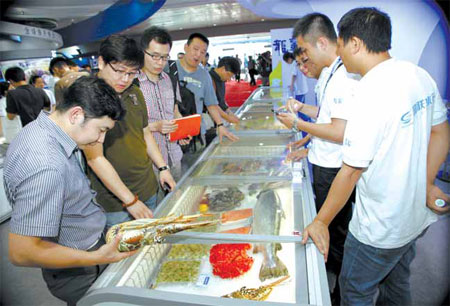
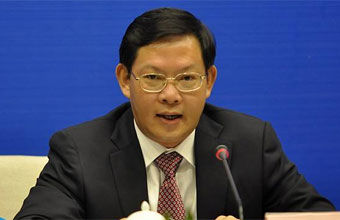 5G construction supports Zhanjiang's high-quality development
5G construction supports Zhanjiang's high-quality development
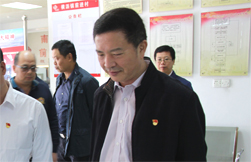 Acting mayor inspects project construction in Xuwen, Leizhou
Acting mayor inspects project construction in Xuwen, Leizhou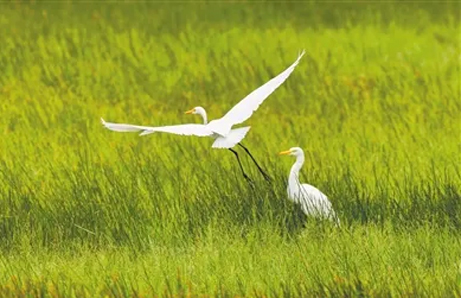 Zhanjiang island an "egret paradise"
Zhanjiang island an "egret paradise" 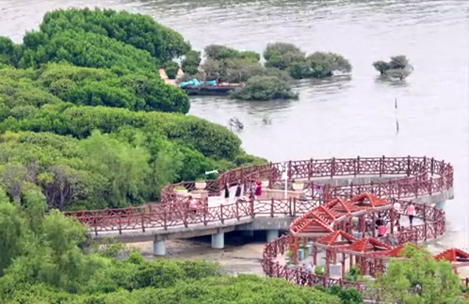 Dancing egrets add vitality to Xiashan
Dancing egrets add vitality to Xiashan